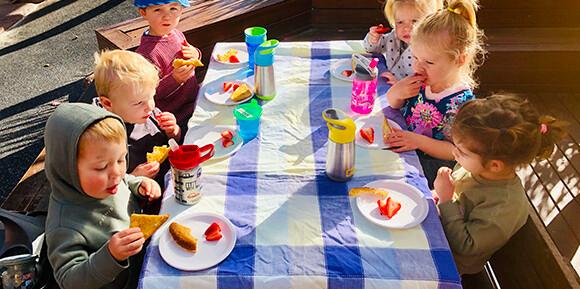Every day in the ELC, all children – from the very youngest in high chairs to the children in the year prior to school – share two formal meal occasions daily: morning tea and lunch. Mid-morning, they are invited to sit in small groups when they are ready to eat and be together with their peers in order to provide them some autonomy and choice. Lunchtime is a whole-group affair with everyone sitting at the same time at tables in small groups, with tablecloths and sometimes flowers or decorations on the table. The children are encouraged to chat with the others at their table and sit in appropriate way, staying seated while eating and drinking. They are supervised by staff to ensure they eat their own food, stay hydrated and engage in appropriate conversations.
Sharing meal times is one way to support small children in developing positive relationships with food. This is so important right from the beginning for all children, starting from babies watching and engaging at meal times to the pre-school child who helps prepare a meal and set the table.
Helping children shape their positive relationships with healthy food, a healthy body and a healthy mind is not just the responsibility of the family, but also the educators and the community. Stephanie Alexander’s Kitchen Garden program, which currently runs at Carey in Year 3, has a sister program for early childhood. There are now cooking workshops for young children and community gardens in the suburbs and in rural areas to encourage children to be involved from the ground up. It is widely understood these days that developing children’s understanding of how food grows, is harvested and cooked before it comes to their plates is endlessly valuable for encouraging positive eating habits. Getting them physically involved in planting, caring for and picking their foods is the next step in engaging them in this world and you might even learn a thing or two from them too!
You can read more about the Carey Kew ELC’s new garden beds and how we are helping children to engage with food and connect with nature.
The next step is enjoying food as a community. Coming together to share food is a long standing ritual in almost all cultures. It is actually a relatively new phenomenon for children to eat different meals to the adults in their lives: one meal would have been prepared and everyone ate the same. Eating together presents the opportunity to continue the healthy food relationship education, as our attitudes to food are certainly shaped by our family, both positively and negatively. For example, forcing children to eat foods they don’t like may not be the most effective way to diversify their diet – we know that to introduce a new food, it needs to be offered at least 10 times and it might not even be tasted, maybe just smelt or touched or poked.
There is a wealth of information out there these days about nutrition, what a balanced diet is, ages and stages for introduction of certain foods. We’re finding out more and more each year through ongoing medical and scientific research, including our greater understanding of allergies and food intolerances and the intervention that is available earlier. There are many websites and resources about food for children such as Stephanie Alexander’s, which is devoted to sharing information about nutrition and health, as well as Dr Felice Jacka, who is the director of the Food & Mood Centre at Deakin University, and Marie-France Laval, a French dietician and counsellor who loves and works in Australia.
Things have come a long way since a school lunch was a vegemite sandwich on sliced white bread in a brown paper bag with a squashed banana. These days, we know so much more about children’s nutrition, and in the ELC we see them eat their sushi, avocado and cheese sandwich, dumplings and rice or hummus dip and vegetable sticks from their Bento lunch boxes. They are aware of being sustainable, composting food scraps, being wrapper free and hydrating by drinking water from their bottle. They discuss foods and healthy eating, and they enjoy food together as a group. Taking care of your body and mind starts at a young age it requires thought, planning, opportunities for conversation and understanding and, importantly, the involvement of the children.
Wendy Seidler
Director of ELC Kew

